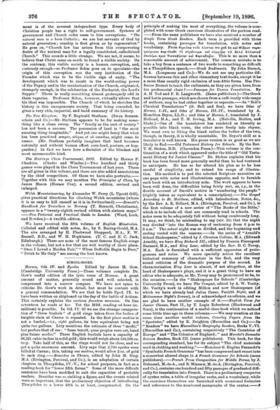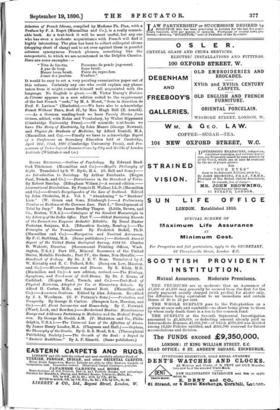SCHOOL - BOOKS.
Horace, Ode IV. and Epodes Edited by James H. Gow. (Cambridge University Press.)—These volumes complete Dr. Gow's useful edition of the lyric verse of Horace. A great amount of matter, generally sound and well selected, is compressed into a narrow compass. We have not space to criticise Dr. Gow's work in detail, but must be content with a general commendation. We see that he holds Epod. IX. to have been written on shipboard on the day of the battle of Actium. This certainly explains the curious fluentem nauseam. On line seventeen he reads at hoc. Yet the MSS. reading ad hunt (sc. militem) is possible. In Od. IV. 69 we see the strange exaggera- tion of " three bushels" of gold rings taken from the bodies of knights slain at Canna: is repeated. In the first place modius is not a bushel,—i.e., eight gallons, its true equivalent being not quite two gallons. Livy mentions the estimate of three " modii," but prefers that of one : " fama tenuit, quae propior vero est, hand plus fuisse modio." Three English bushels have a capacity of 66,521 cubic inches in solid gold ; this would weigh about 124,508 oz. troy. Take half of this, as the rings would not lie close, and we get a quite enormous amount. Livy says that 2,700 equites were killed at Cannte ; this, taking one modius, would allow 2 oz. of gold to each ring.—Brasidas in Thrace, edited by John M. Sing, M.A. (Rivington, Percival, and Co.), is an adaptation of certain chapters in Thucydides, IV.-V., for school purposes, in fact as a reading-book for "lower fifth forms." Some of the more difficult sentences have been modified to suit the capacities of probable readers. Brasidas was so striking a figure, and the events related were so important, that the preliminary objection of introducing Thucydides to a lower fifth is, at least, compensated. On the principle of making the most of everything, the volume is com- pleted with some Greek exercises illustrative of the portion read. —From the same publishers we have also received a number of Single Term Greek Readers. Each term is provided with three books, containing passages for translation, with notes and vocabulary. From OnptTicrw rah Aiovras we get to Sal eil3pco, 7f VeitlEPOS rap-A.afif O'Tpd-r *WU& Sal filltltOlaS Tr 6A EXX7)YAKii iwoXipet wpos T!cr0affpsriv Kal +apraf3aCor. This is no more than & reasonable amount of achievement. The common mistake is to. take a boy from a sentence of two words to something as difficult as a Thucydidean speech.—Greek Rudiments. By John Burnet, M.A. (Longmans and Co.)—We do not see any particular dif- ference between this and other elementary text-books, except it be a more than usually rigid exclusion of non-Attic forms. Has Pro- fessor Burnet to teach the rudiments, as they are given here, from his professorial chair P—Passages for Unseen Translation. By A. H. Tod and F. R. Langworth. (Same publishers.)—The Greek and Latin passages, which are chosen from a sufficiently wide range of authors, may be had either together or separate.—In " Bell's Classical Translations" (G. Bell and Son), we have Odes of Horace, and Odes of Horace, III.-IV., translated by A. Hamilton Bryce, LL.D.; and Odes of Horace, I., translated by J. Holland, M.A., and T. H. Irving, M.A. (Melville, Mullen, and Slade.)—One of the translators has rendered as literally as possible into blank verse, the other more freely into rhyme.. We must own to liking the blank rather the better of the two, though, in theory, it is wholly unsuitable. Dr. Bryce's skill as a: translator is well known. His prose version is as good as we are likely to find.—Old Testament History for Schools. By the Rev. T. H. Stokoe, D.D. (Clarendon Press.)—This volume is the con- tinuation of a work which appeared under the title of " Old Testa- ment History for Junior Classes." Dr. Stokoe explains that his. book has been found more generally useful than he had ventured to anticipate. He has so far altered his plan as to be less careful of simplicity, and to extend his range of illustra- tion. His method is to put the selected Scripture narrative on one page with notes and illustrations opposite, and to furnish each book with an introductory note. The work appears to have- been well done, the difficulties being fairly met, as, e.g., in the double account of David's motive in "numbering the people (rightly taken as equivalent to a conscription).—The Gospel According to St. Matthew, edited, with Introduction, Notes, &c.„ by the Rev. A. E. Hillard, M.A. (Rivington, Percival, and Co.), ta- ttle first volume of a new series of "The Books of the Bible,' which is to include all that are commonly read in schools. The notes seem to be adequately full without being cumbrously long. It may, we think, be misleading to say (xiv. 25) that the night was divided "into the Roman way of reckoning from 6 p.m to 6 &m." The actual night was so divided, and the beginning and ending varied with the seasons.—In the series of "Arnold's School Shakespeare," edited by J. Churton Collins, M.S. (Edwavtil Arnold), we have King Richard III., edited by Francis Pierrepont Barnard, M.A., and King Lear, edited by the Rev. D. C. Tovey, M.A. Each is furnished with a sufficient apparatus of prole- gomena and notes. We more specially notice the excellent historical summary of characters in the first, and the very sound criticism of the dramatic purpose of the second. In characterisation King Lear is almost, if not altogether, at the head of Shakespeare's plays, and it is a great thing to have am editor who is adequate, as Mr. Tovey may be pronounced to be, to the occasion.—In the " Shakespeare for Schools" (Cambridge University Press), we have The Tempest, edited by A. W. Verity.. Mr. Verity's work in editing Milton and now Shakespeare (of which we have already had Julius Caesar, Twelfth Night, and A Midsummer Night's Dream), is of acknowledged excellence, and we are glad to have another example of it.—English Verse for Junior Classes, Part II., by T. Logie Robertson (Blackwood and Sons), is the continuation of a useful class-book which we noticed some little time ago in these columns.—We may mention at the same time another useful volume, Coverley Papers from the "Spectator," edited by K. Deighton (Macmillan and Co.)—In "Readers" we have Macmillan's Geography Readers, Books V.-VI. (Macmillan and Co.), containing respectively " The Countries of Europe" and "The Colonies of England;" and Murche's Domestic Science Readers, Book III. (same publishers). This book, for the corresponding standard, has for its subject " The chief materials used in clothing and washing."—Monsieur G. Eugene Fasnachtt's " Synthetic French Grammar" has been compressed and recast into. a somewhat altered shape in A French Grammar for Schools (same publishers).—Prench Prose Composition for Middle Forms, by J. Duhamel, M.-es-A., and B. Minssen, M.-es-A. (Rivington, Percival, and Co.). contains one hundred and fifty passages of graduated diffi- culty for translation into French. There is a preliminary conspectus of syntax rules, a table of irregular verbs, and a vocabulary, while the exercises themselves are furnished with occasional footnotes and references to the numbered paragraphs of the svntax.—A Selection of French Idioms, compiled by Madame Ph. Plan, with a Preface by F. A. Roget (Macmillan and Co.), is a really remark- able book. As a text-book it will be most useful, but any one who has even a moderate acquaintance with French will find it highly interesting. The plan has been to collect colloquial idioms (stopping short of slang) and to set over against them in parallel columns synonymous French phrases, something like the interpretatio, to which we are accustomed in the Dolphin Classics. Here are some examples : - `r Tete de linotte. Personae de pende jugement.
A pas de loup. Sans bruit. Mener beau bruit. Faire du reproches.
Joner des jambes. S'enfuir."
It would be easy to sot a very puzzling examination paper out of this volume. Certainly any one who could explain any phrase taken from it might consider himself well acquainted with the language. No English is given.—M. Victor Duruy's Histoire de l'Orient appears in a new edition suited to the requirement of the last French " code," by M. A Moret, " Sous in direction de Prof. F. Lavisse " (Hachette).—We have also to acknowledge French Without Tears, Book IL, by Mrs. Hugh Bell (E. Arnold). —As a German reading-book we have Twenty Stories from Grimm, edited, with Notes and Vocabulary, by Walter Rippmann (Cambridge University Press).—Of scientific text-books we have The Story of Electricity, by John Munro (George Newnes), and Physics for Students of Medicine, by Alfred Daniell, M.A. (Macmillan and Co).—Finally we have to acknowledge Report of a Conference on Secondary Education held at Cambridge, April 21st, 22nd, 1896 (Cambridge University Press), and Pro- gramme of Technological Examinations by City and Guilds of London Institute (Whittaker and Co.)



































 Previous page
Previous page